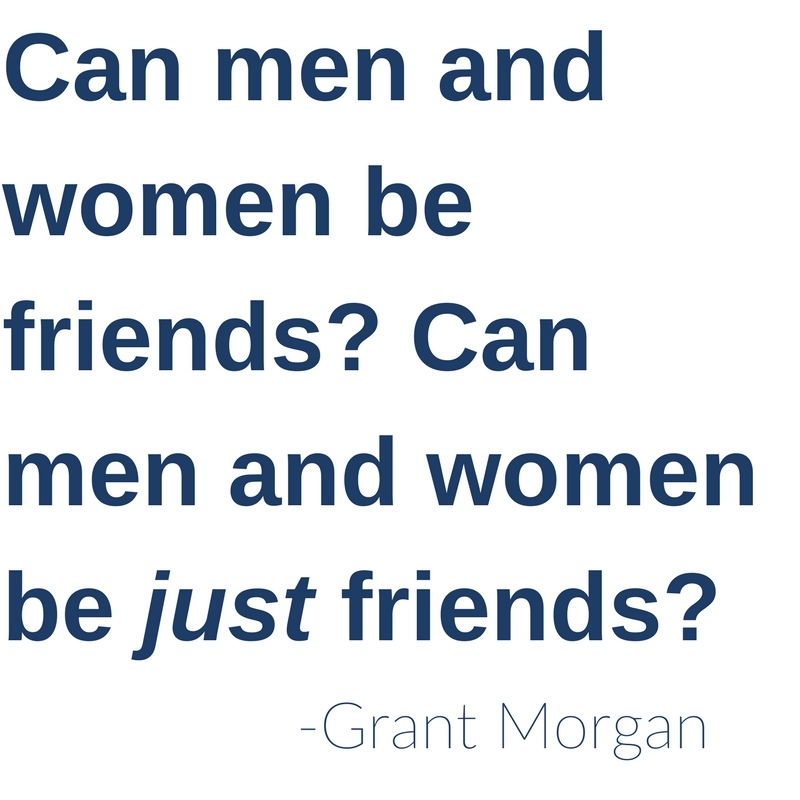As we continue our series on friendship, GRIT is delighted to introduce our very first male contributor, Grant Morgan. Grant is a Biola alumni ('17) and a current Talbot student. We asked Grant to share his thoughts on a subject where opinions are many, but quality conversation is sparse. Check out his piece below, and let us know what you think!
“Can men and women really be friends?”
Ah, there it is. In slightly modified form (emphasis mine), there is the question from the classic artifact of pop-psychology known as, When Harry Met Sally. The film has been the go-to anecdotal evidence for countless think-pieces examining male-female friendship ever since its release in 1989. When Harry Met Sally has left its mark on our culture because the question it raised has been debated and analyzed and wrestled with in-perpetuity for its universality. Much like, “Why does God let bad things happen?” the problem of male-female friendship has become nearly as ubiquitous as the problem of evil. Can men and women be friends? Can men and women be just friends? Can men and women really be just friends? Before I give you the (or rather my) answer to that question, I feel the need to build a case as to why you should listen to me beyond the simple fact of me being a man writing for a women’s resource collective.

I am a man. I am not just a man, but a man writing from well within the bounds of the evangelical power structure. I am white (at least as far as today’s definition of white goes). I am straight. I am in seminary because my background conspired to afford me with the resources to follow what I deemed to be God’s call upon my life. I write all of that, not in a “woke” (that’s what the kids say these days) attempt to disavow my white privilege in a self-loathing way (we get enough of that on the internet, I don’t need to add to that to make myself sound righteous or like a martyr for recognizing something I obviously have) but because as my readers, you will quickly realize that your experiences may differ from mine in countless ways. Your experiences will be very different because they may, and very likely will, come from places and family structures and ethnic backgrounds in which I have no experience. So, to those experiences, I cannot speak. I write this piece to speak from my experiences and mine alone.
I was raised by women and I have a girl best-friend. I spent roughly 80% of my childhood growing up in a single-parent home with my Mom (side-note: I will be capitalizing “Mom” throughout this article because it is both her title and the name I call her, and because she is a certified boss). This was not because my dad was unsupportive or disconnected from my life, but because for most of my childhood he lived on the opposite side of the country and I only saw him during school-breaks. My Mom was my mother, friend, confidant, role-model, primary caregiver, champion, breadwinner, spiritual guidance, and head-of-household. Along with my Mom, I also grew up living with my younger sister, a powerful woman in her own right. Almost every day in my house for over 18 years I have been outnumbered two to one. This resulted in some unique socialization that I’ve spoken at length about with my therapist: I have an easier time making friends with women than men.
This is not to say that I don’t have male best-friends. I have more male-best friends than female friends, but I have a harder time becoming friends with other men and it takes me longer to trust them. All of this is important to say on the front end of this article because it flies in the face of the evangelical narrative. The evangelical narrative (the dominant narrative in which we exist daily at schools like Biola and in the Christian subculture in general) is a narrative of stark difference between men and women. The evangelical narrative by and large has taken the cultural narrative (the American cultural narrative) about men and women and baptized it in spiritual language, implicitly telling us that this narrative is God’s narrative. Here are some examples: “Women are innately sexual objects. Men are unable to control their sexual desires. Women are complex and men are simple. Women are sensitive and men are rough. Women are gentle and men are violent. Men are leaders and women are submissive. Women are responsible for both their purity and the purity of men. When you get married, you better drop all of you opposite-gender friends.”
There may be truth in some of these claims and I do not want to discount them wholesale, but to take these claims as a unified worldview is the height of foolishness and frankly, a load of nonsense. I have found in my personal experience that many of these claims have been handed down unquestioned for generations. Many of these claims find their way into the language of people we love and respect. The last statement was even spoken to one of my undergraduate classes by a professor as if it was wisdom from God. Let me reassure you, sexism is the language of oversimplification, not the language of wisdom. God has not spoken an 11th commandment down from heaven that says, “When you get married you must drop all of your opposite gender friends.” Will opposite gender-relationships change when you get married (if you get married, not everyone is called to this and marriage is its own idol in our culture but I’m not writing another think-piece right now)? Absolutely those relationships will change, but so will all of your relationships. But I digress, in my experience, these are the things I know to be true of opposite gender friendships:
1) They are possible. They can be difficult but they are possible. I was talking to one of my best friends the other day (he’s a guy, but he’s dating my best friend who’s a girl) and he said men and women cannot be friends without one or both of them considering what it would be like for them to be more than just friends. I agree with this. In general, one or both parties has at least thought about what it would be like for the two of them to be more than friends. The act of thinking about it however, in and of itself, does not doom the friendship to a weird fate of ongoing sexual-tension. Male and female friends that remain friends in the long-run have thought about it and decided that they do not want to be more than friends. My friend and I (the best friend who’s a girl) are so close because of our shared similarity in upbringing and our mutual experience of severe hardship in school, not because I’m secretly in love with her or she’s secretly in love with me.
2) Their foundations determine if they end. In my experience, there are roughly three types of male-female friendships. Those that are true best-friendships based upon shared experience and honesty (mine and my friend’s), those based on one-sided or mutual attraction (secret crushes, these are the ones that generally blow up after a semester or a few months when things become complicated or feelings aren’t reciprocated), and friends with distance. Friendships based and mutual or one-sided attraction and friends with distance are by far the most common.
Many of you, if not all of you have likely experienced friendships based on mutual or one-sided attraction. These are the friendships that make crappy semesters and great plots for romantic comedies. I’ve been in these, you’ve been in these, we’ve all at some point been in these. They are vague, seldom well-defined, and based around a lot of open-ended “hanging out” that feels somewhat like a date but nobody is really sure. Biola and many Christian universities’ dating-cultures are built around these and that’s what makes it so horrible. This happens because in Christian circles there exists a youth-group mentality that says you have to be friends with someone before you date them. This isn’t true. The entire purpose of casually dating people is to get to know them so you can decide if you want to pursue a deeper relationship with them. The sooner we can start asking people out directly without tip-toeing around the subject and creating weird friendships based solely on our unspoken interest in each other, the sooner we can find meaningful friendship and meaningful romantic relationships.
Friendships with distance are interesting. They are true friendships, good friendships, that contain necessary distance to maintain them. Here’s what I mean: There are two girls that I became good friends with while working for Biola’s student government. I love them both and have gone to both for fellowship and advice. I do not hang out with them in vague, undefined, date-like settings. This is because the culture in which we exist is one of undefined date-like settings and undefined “hanging out” and DTR’s. We hang out to catch up. We go to breakfast to share stories. We meet up and reminisce about our days in the student government. We don’t hang out one on one on my couch watching movies on the regular.
Lastly, let’s go back to true best-friendships based on shared experience and honesty. These are by far the most rare and require the most work. My best-friend who is a girl is in a long term relationship with one of my other best-friends who is also my roommate. We don’t fight about it. We talk about it. The friendship between her and I works because it was built on a foundation of a friendship that the three of us all shared before he and she started dating. We have known each other since our freshman year and been through more hardship together than I ever thought we would experience in college. Our friendship requires openness. I have sat down with my male best-friend and we have talked repeatedly about our friendship and my friendship with my girl-best friend. He is going to read this article before it’s printed, because, just like in the friendship, I love and respect him and want his input.
Likewise, when I started dating my girlfriend I had to explain to her in detail the nature of the friendship between my girl-best-friend and I. Thankfully she has been blessed with the experience of having male best friends and in some ways can understand. But guess what: I still get jealous. I would love to say that I’m perfect and that I don’t get jealous but I do. I’m sure she does. My guy best-friend does too. BUT, we don’t sit silently in our jealousy. We talk about it. We name it, we draw it out into the open so that it can be seen for what it is. We don’t quietly pressure our significant others into giving up their friendships. Instead, we do the hard work, the long-work, the ongoing emotion-work of navigating healthy male-female friendships. And we’re honest with ourselves about the friendship.
There you have it dear readers, another hot-take on the topic of male female friendships. They exist but they’re hard. They require a lot of patience and work and most importantly, grace. Like every other area in our fallen world, we get a lot farther when we strive for grace rather than merely what “should” or “shouldn’t” be. The next time some professor shoots his/her mouth off about how men and women can’t be friends, remember that isn’t true, but also remember to give them grace, because they need it as much as we do in our male-female friendships. If you’ve been in (or are currently) in a friendship based on one-sided or mutual attraction, then my advice to you is to go for it, and don’t worry about losing the friendship if it doesn’t work, because that friendship isn’t based on something sturdy anyway. If it works out, you have the chance of becoming something closer than friends, and if it doesn’t, then at least you aren’t stuck in relational purgatory longer than you need to be.
If you have friendships with distance then enjoy them. They are awesome and life-giving and the lack of undefined movie-nights exist to protect everyone involved from emotional vagueness. Lastly, if you have one of the rare, true best-friendships based on shared experience and honesty, fight for it. These friendships are life-giving and worth it. They will almost always be worth the emotion work they require to maintain.
-Grant
Grant Morgan is a Biola Communication Studies graduate, a first-semester Masters student at Talbot, book-lover, writer, foodie (according to his dad), and amateur-academic. All opinions are his and likely flawed. If you enjoyed this piece you’ll enjoy his lightly censored twitter ramblings @grantm1218

 Biola University
Biola University




